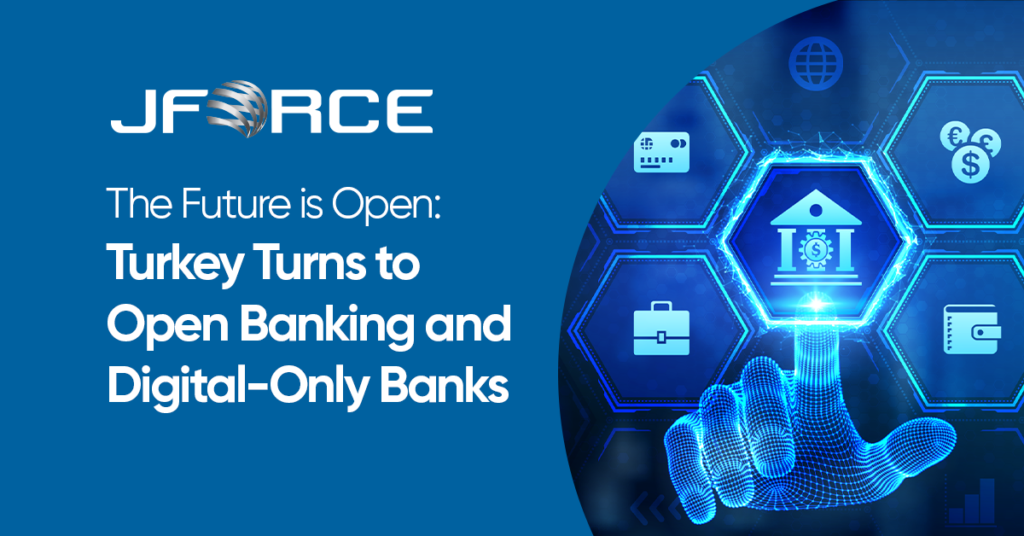
Digitalization is inevitable in this era when we have difficulty keeping up with technological developments. All industries are in a digital transformation to keep pace with technological advances. In recent years, banks have been moving beyond basic banking services with the advancement of technology as well as modernizing the services they provide to customers and maximizing them.
Increasing digitalization with the pandemic is also changing the banking sector. Banks aim to provide the most reliable, fastest, and highest quality service for their customers by taking advantage of the benefits of the online world and bringing the future to the present. One of the most important and popular steps taken towards digitalization with revolutionary innovations is Open Banking.
JFORCE Information Technologies offers fast, reliable, and high-quality digital banking services with open banking and digitalization solutions to banks in the digital transformation process with the references of its leading strategic partners.
The Future Is Open
In the current technological era, financial institutions should continue their existence by adapting to open banking solutions. Soon, we will start hearing about open banking and digital banking concepts very often.
Open banking, in its simplest definition, is a reliable financial service model in which financial data is shared with third-party organizations to provide better banking services. Third-party Fintech companies and the applications developed by banks, whose number has increased with the acceleration of digitalization in the pandemic period, are increasing their power day by day.
Digital-only banking, which has been talked about a lot in developed economies in recent years, is an innovative system where banks offer many financial services to their customers without branches. This new system in banking seems to be carried to different dimensions with various banking regulations.
According to economists' forecasts, the cautious attitude of policymakers, who are worried about instability in financial markets, towards cryptocurrencies will continue in the developed economies. Governments, on the other hand, will try to take control with digital banking licenses and develop their own digital currencies.
Increasing Digitalization with the Pandemic
Through the Covid-19 pandemic emerging in late 2019, digitalization in all areas has progressed much faster than predicted. Banking activities have also kept pace with the digital transformation, allowing banks to expand open banking and digital-only banking services.
Each day, we hear about digital banks more and more often. Since the digitalization has accelerated due to the pandemic, we had to experience the digital transformation, which would take 3-4 years in normal flow, within 1 year. Open banking and digital banking activities will take a much more important place in our lives in the near future through the steps taken by the financial authorities.
According to a report by Economist Intelligence, in 2022, the financial industry will focus on regulations for new financial technologies, and Fintech startups will continue to increase. Fintech companies focus on many services such as mobile payment technology, fingerprint-enhanced security measures, and portfolio management with artificial intelligence support.
JFORCE's expert software team is ready to modernize your banking infrastructure thanks to its solution-oriented approaches to open banking and digital banking, which are among the most important steps of the financial industry towards digital transformation.
Changing the Banking Sector
Financial experts emphasize that it is no longer possible to carry out transactions only with with traditional methods in the banking sector which evolves digitally.
Traditional banking institutions are also now cooperating with emerging financial service providers. With digital innovation solutions, bank employees now provide fast service through business process automation projects instead of conducting all transactions on paper. In addition, customers can also carry out their desired transactions in a short time with digital banking services instead of waiting in long queues.
Besides, it is predicted that open banking and digital-only banks will also be among the most important agendas in the coming years. It is believed that Fintech companies will offer new models with new products via strengthening API infrastructure.
The digital banking regulation published by the BDDK in Turkey, which will be effective by January 2022, provides an innovative transformation in the banking sector. This regulation aims to set the procedures and principles of the activities of branchless banks.
As digital banking will be more reliable and effective with the financial regulations to be introduced in the coming years, the digital banking model will increase its share in the sector.
Financial Authorities Focus on Regulations: The Case of Turkey
The Turkish government has recently announced its new digital banking regulations and initiatives. According to this new regulation, as of January 15, 2022, companies with a capital of 1 Billion Turkish Liras will be able to offer services to their customers through an online platform.
The government hopes that this innovative system will improve security and ensure efficiency in the banking sector in Turkey. The digital banking model supported by this regulation strengthens a very advantageous service concept for both banks and customers.
So how does the digital banking model promoted by this new regulation benefit banks and customers?
First of all, paperless banking is spreading and onboarding and verification processes are automized. Since many financial transactions can be processed via online platforms, customer acquisition time and costs decline. Thanks to the improved customer experience, financial services can now be provided digitally quite quickly and reliably.
This innovative decision of Turkey for the future may be a sign of what will happen in the future when it comes to banks. It also hints at how open banking and digital banking systems will become more widespread as the digital transformation continues.
Conclusion
With new banking regulations compatible with digital transformation, the banking industry will focus more on open banking.
JFORCE, as one of the leaders of the Turkish banking technology industry, provides digital transformation infrastructure to its solution partners with smart banking services.
